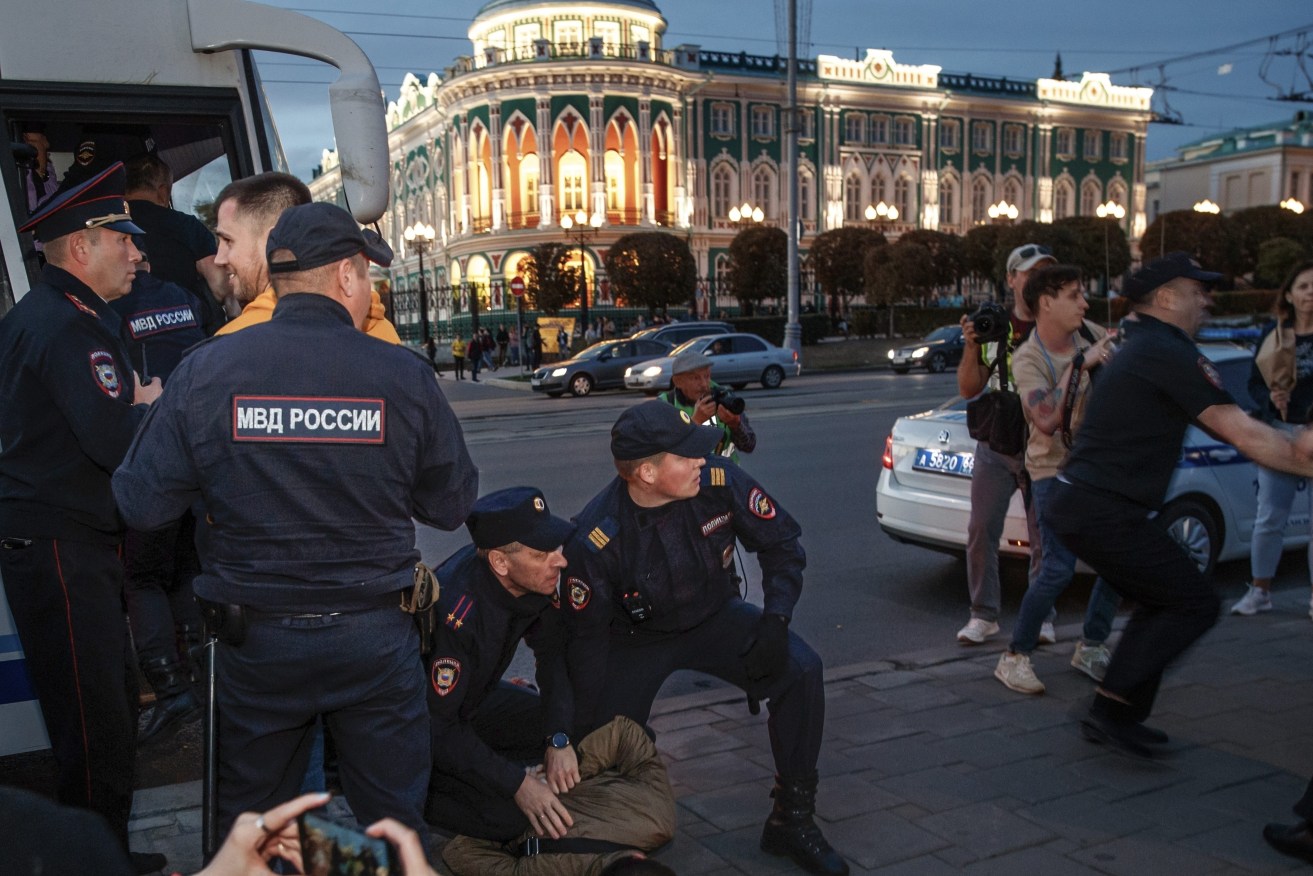Will last draft-dodger to flee Russia please switch off the lights
The Kremlin says no decision has been taken on whether to seal Russia’s borders to stop an exodus of military-aged men fleeing the country, after days of chaotic scenes during its first military mobilisation since World War II.

FILE Police detain demonstrators during a protest against mobilization in Yekaterinburg, Russia, Wednesday, Sept. 21, 2022. Russian President Vladimir Putin has ordered a partial mobilization of reservists in Russia, effective immediately. (AP Photo, File)
Asked about the prospect of the border being shut, Kremlin spokesman Dmitry Peskov told reporters: “I don’t know anything about this. At the moment, no decisions have been taken on this.”
Reports that Russia might close the frontier have contributed to turmoil since President Vladimir Putin gave the order last week to call up hundreds of thousands of reservists in the biggest escalation yet of the seven-month Ukraine war.
Flights out of Russia have sold out and cars have piled up at border checkpoints, with reports of a 48-hour queue at the sole road border to Georgia, which allows Russian citizens to enter without a visa.
A senior Russian MP from the ruling party said men of fighting age should not be allowed to travel abroad.
“Everyone who is of conscription age should be banned from travelling abroad in the current situation,” Sergei Tsekov, who represents Russian-annexed Crimea in Russia’s upper house of parliament, told RIA news agency.
Two exiled news sites – Meduza and Novaya Gazeta Europe – both reported that the authorities were planning to ban men from leaving, citing unidentified officials.
The mobilisation was accompanied by an announcement by Putin that Russia would stage votes to annex four Ukrainian provinces occupied by its forces.
Ukraine and its allies call the votes, due to conclude on Tuesday, a sham pretext to seize territory captured by force.
The mobilisation has led to the first sustained protests in Russia since the war began, with one monitoring group estimating at least 2000 people have been arrested so far.
All public criticism of the “special military operation” is banned.
The mobilisation has also prompted the first sustained criticism of the authorities within state-controlled media since the war began, with pro-Kremlin commentators denouncing officials for calling up people too old to fight or otherwise ineligible.
Peskov acknowledged that some call-up notices had been issued in error, saying mistakes were being corrected by regional governors and the ministry of defence.
Russia counts millions of former conscripts as official reservists.
The authorities have not spelled out precisely who is due to be called up – that part of Putin’s order is classified – but have said they will draft 300,000 people, mostly with recent military experience.
The UK’s Ministry of Defence said on Monday “many tens of thousands” of draftees had already received papers.
They were expected to be sent swiftly to the frontline where they were “likely to suffer a high attrition rate,” it said.
Images circulating on the internet have shown clashes between crowds and police, particularly in areas where ethnic minorities predominate, such as mainly Muslim Dagestan in the south and Buryatia, home to Mongol Buddhists, in Siberia.
The annexation votes are being held in Kherson and Zaporizhzhia provinces in Ukraine’s south and Luhansk and Donetsk provinces in the east, around 15 per cent percent of Ukraine’s area, equivalent to the size of Portugal.
None of those provinces is now fully under Russia’s control and fighting has been underway along the entire front line, with Ukrainian forces reporting more advances since they routed Russian troops in a fifth province, Kharkiv, earlier this month.
President Volodymyr Zelenskiy met his security chiefs on Monday to plan ways to counteract Russia’s use of “new types of weapons” after it stepped up attacks in the Odessa region using Iranian combat drones.
Russia carried out at least five attacks on targets in the region using Shahed-136 drones in the last few days, Serhiy Bratchuk, spokesman for Odessa’s regional administration, told a news briefing.
One of the attacks hit an undisclosed military target in the southern region in the early hours of Monday, he said.












